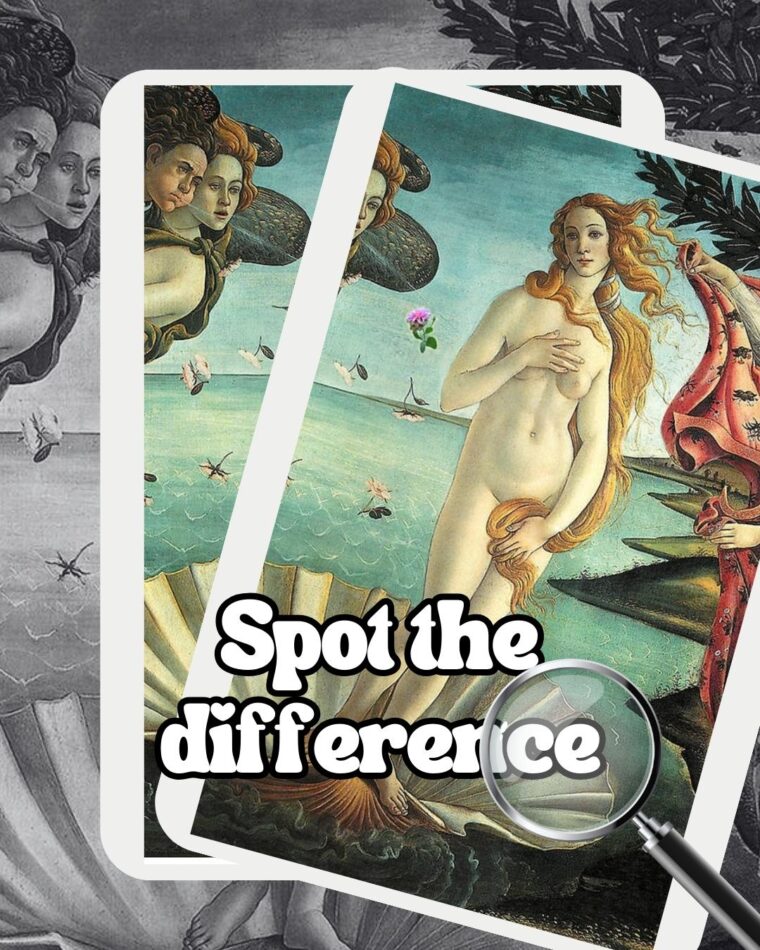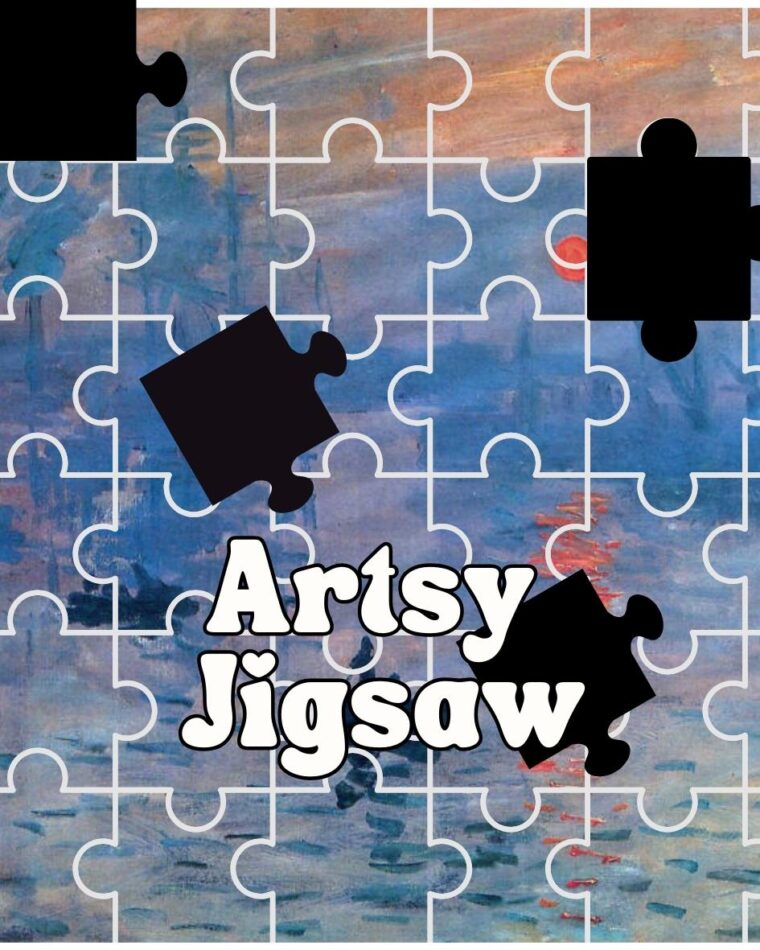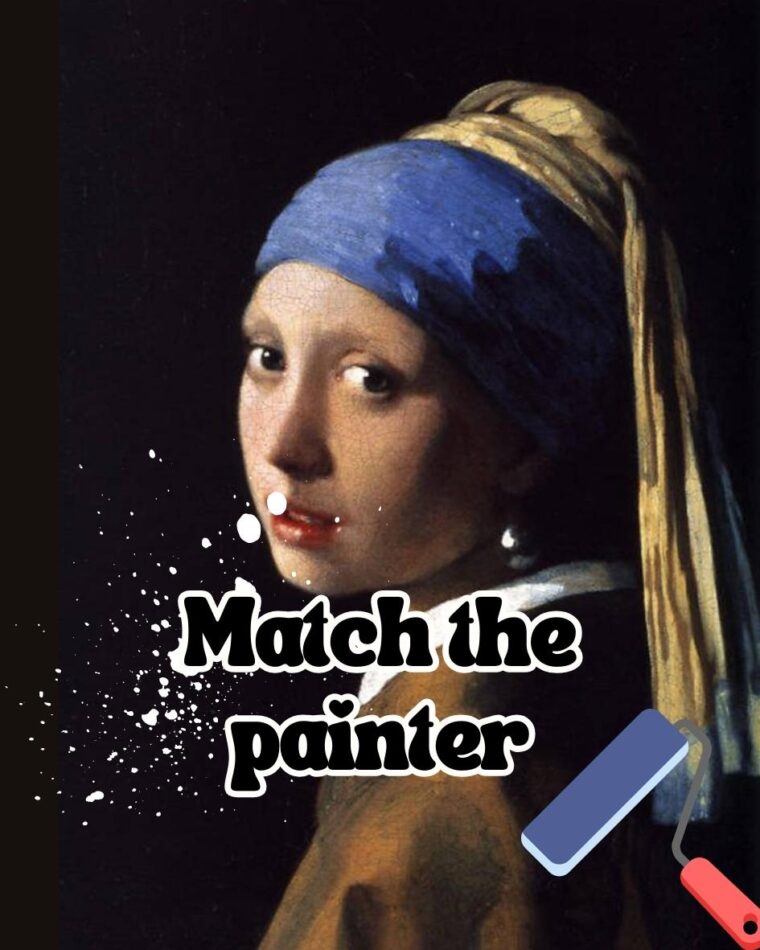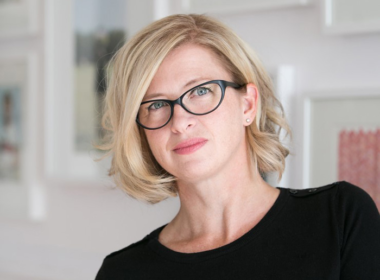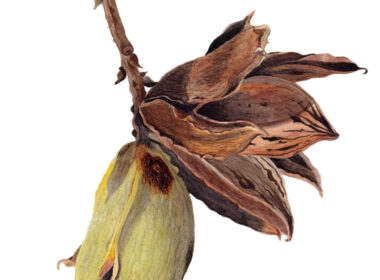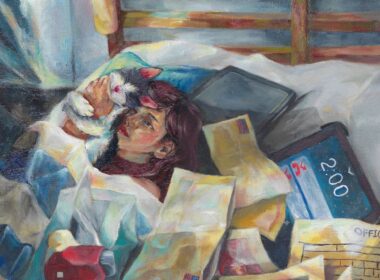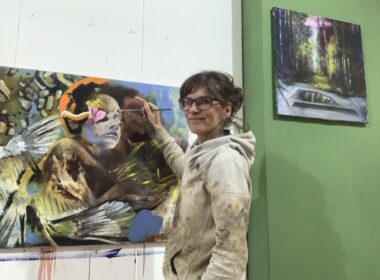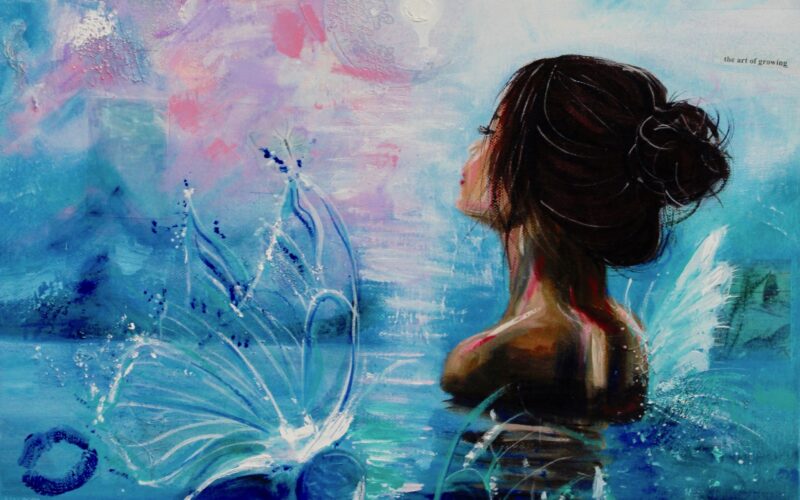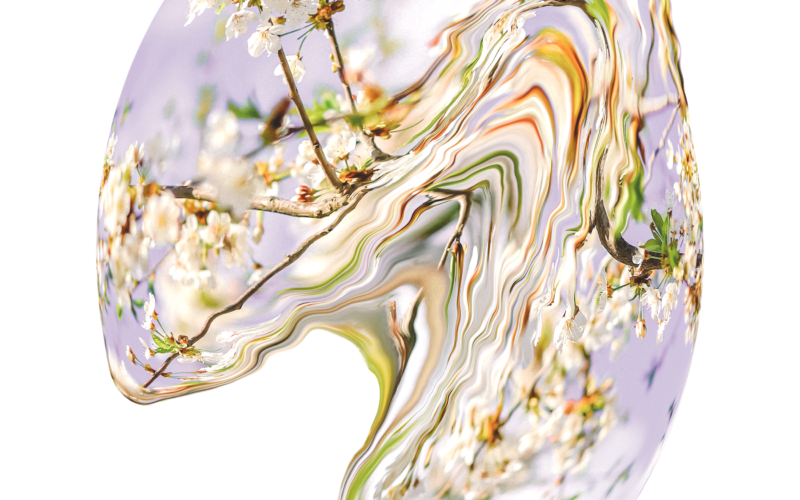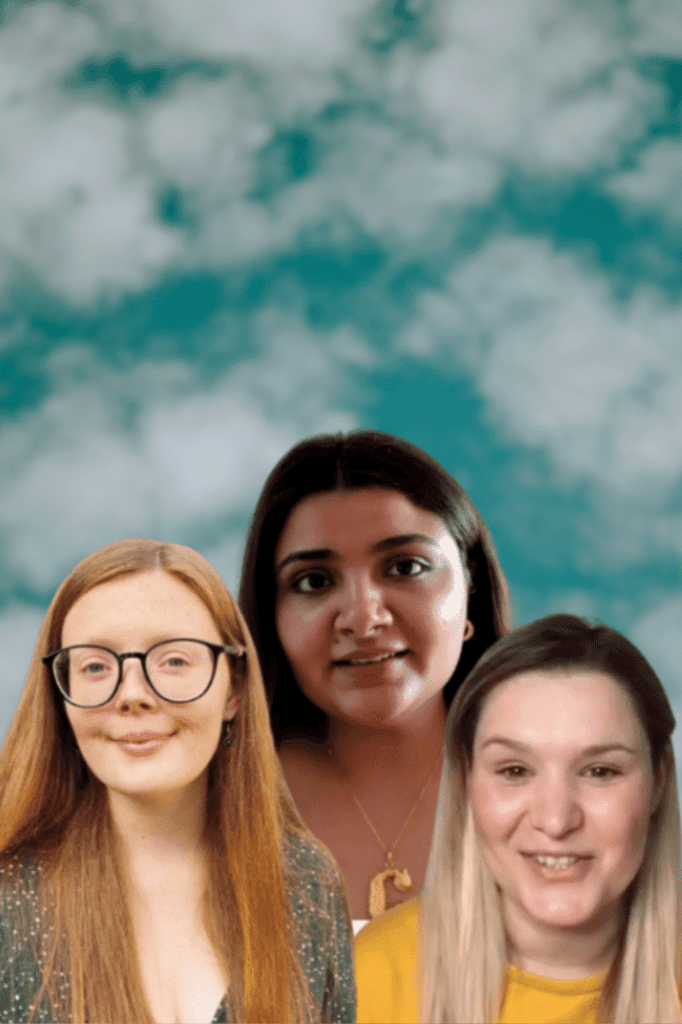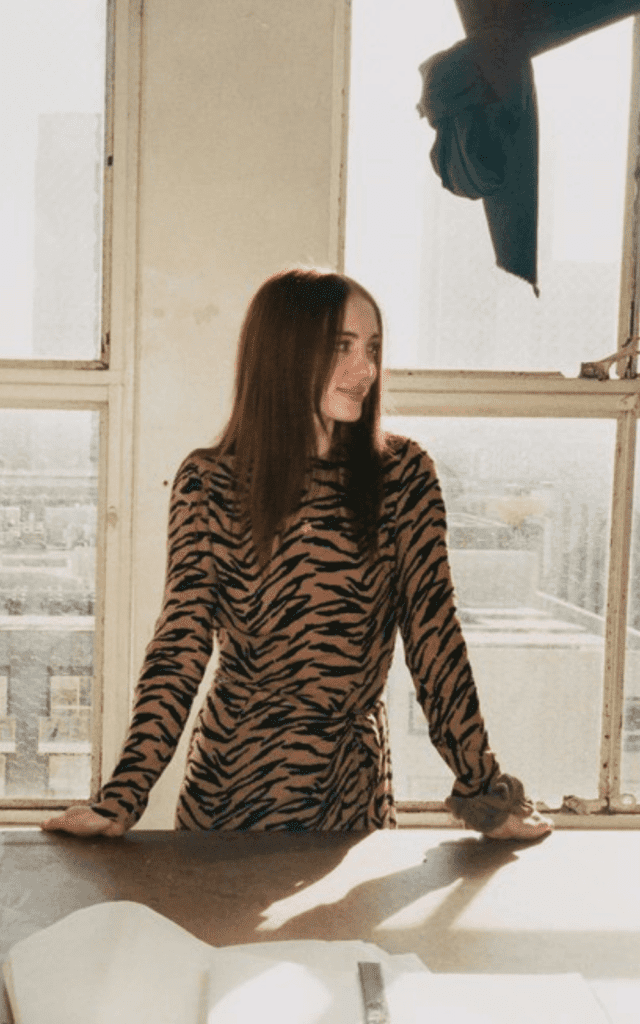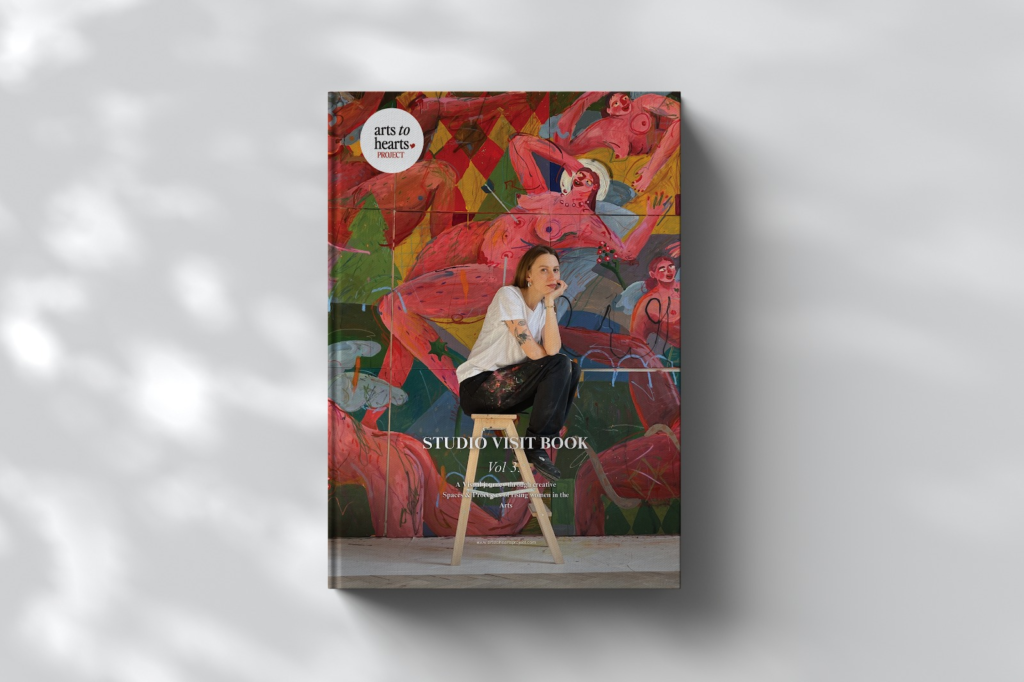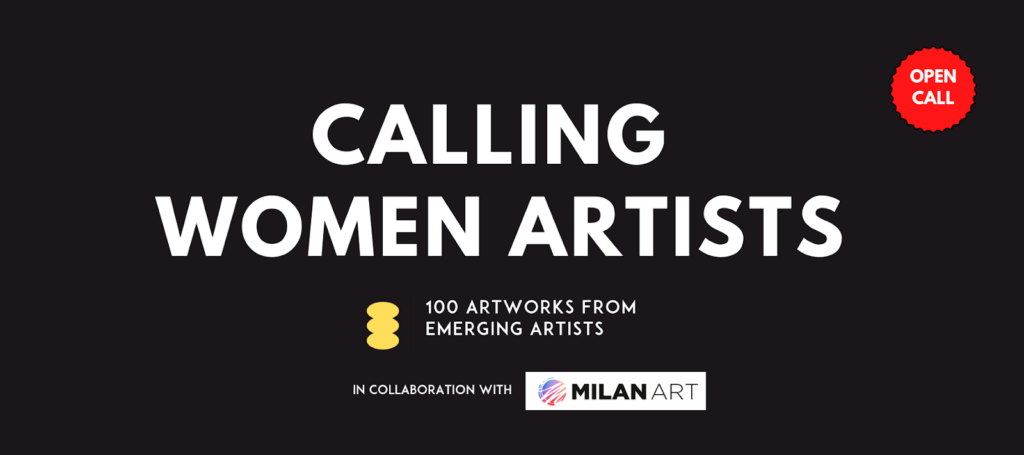

Watch & Listen to this podcast Episode.
On this week’s Arts To Hearts Podcast, we have Ocki Magill, the founder and creative director of Blue Shop Cottage, an incredible gallery based in Camberwell, South East London. Blue Shop Cottage embodies everything you could want in a gallery—authenticity, approachability, and consistently fresh curation that always leaves room for surprises. But its core mission truly sets it apart: to help artists grow.
Ocki has built a platform that supports artists at every stage of their journey, whether through residency programs, online group shows, or full solo exhibitions in her magical gallery space. Her passion for helping artists develop shines through in everything she does, making Blue Shop Cottage a haven for emerging creatives.
Ocki takes us through her unique journey from advertising and fashion design to establishing a gallery that champions and nurtures emerging artists. Throughout the interview, Ocki emphasizes the importance of following your passion, especially when it leads you to unexpected and fulfilling paths. She also discusses how building a strong sense of community is at the heart of her work, highlighting how collaboration and support networks can empower artists and gallery owners.
Ocki shares her valuable insights on adapting to the ever-evolving art world. She offers practical advice to artists on perfecting their craft, presenting themselves professionally, and developing a strong online presence in today’s digital age. She stresses the importance of artists actively engaging with their communities, attending shows, and building meaningful relationships within the art space.
Don’t miss out on this interview, which offers valuable insights into how creativity, resilience, and a collaborative spirit can help artists navigate and succeed in the modern art landscape. Tune into this week’s full episode!
This set effectively summarizes and segments the detailed content of the interview into easily navigable chapters for viewers.
| Timestamp | Summary |
|---|---|
| 0:00 | Introduction to Arts to Hearts Podcast |
| 4:18 | Evolution from Blue Shop Cottage to Blue Shop Gallery |
| 9:52 | Challenges in Transitioning to a Gallery Owner |
| 16:35 | Advice for Emerging Artists on Gaining Representation |
| 23:45 | Developing a Unique Artist Story and Leveraging the Internet |
| 27:04 | Upcoming Shows and Artists at Blue Shop Gallery |
| 30:11 | Works on Paper Open Call Details |
**** – (): Charuka (00:02.394)
**** – (): And here we go. Okay. Hello, everyone. Welcome to the Arts to Hearts podcast. I’m back again with another guest. And today I have Aki from the Blue Shock Cottage. Welcome to the…
**** – (): Ocki Magill (00:15.874)
**** – (): it’s actually Blue Shop Gallery.
**** – (): Charuka (00:19.758)
**** – (): I’m Auki from the Blue Shop Gallery. Welcome to the podcast, Auki.
**** – (): Ocki Magill (00:26.185)
**** – (): Thank you for having me. It’s nice to be here. Always nice to chat to people, especially on a Monday.
**** – (): Charuka (00:31.758)
**** – (): Well, how’s your Mondays like? That’s a good point to start with. What is your Monday look
**** – (): Ocki Magill (00:37.373)
**** – (): So yeah, Mondays are good for us. So we are currently inside what was Blue Shop Cottage. So Blue Shop Cottage was the original gallery space. basically it started off with me finding like a shop house and converting it into a home. But then the sort of shop on the front became the gallery.
**** – (): Charuka (00:48.993)
**** – (): Okay.
**** – (): Ocki Magill (01:04.777)
**** – (): So every Monday when the gallery, Blue Shop Gallery, which has since opened, is closed Mondays, Tuesdays. So we work here as a team at the cottage on Mondays, which means we kind of, yeah, we can just kind of go over. We also do lots of studio visits on Mondays. It’s a kind of much softer day of just like checking up on sales over the weekend, checking in with artists. So it’s kind of Monday is a lovely cottage day.
**** – (): Charuka (01:33.616)
**** – (): wow. So when you say cottage, do you like, is it like a cottage cottage? Is it like also placed in a very scenic, how I’ve never been to London yet. So I’m only imagining it through your words. What does it, like what is, how do you define a blue shop gallery different from a blue shop cottage?
**** – (): Ocki Magill (01:52.925)
**** – (): So in 2016, I was looking for somewhere to live. And instead of sort of getting a flat, I basically found this beautiful glass-fronted miniature little shop in Camberwell. And it looked like a kind of Parisian sweet store or like a kind of a gorgeous little fantasy
**** – (): Delhi, like somewhere where as a child you’d be kind of, you know, hands up to the window, blowing steam into the glass. was just, yeah. So it’s the most beautiful little blue shop and it had this red and white awning. And I remember seeing it at years before I found it online, being like, isn’t that the most gorgeous little shop? Anyway, it came, it was for sale and I came to look at it and I looked inside and it basically just kind of
**** – (): Charuka (02:27.618)
**** – (): Now I have.
**** – (): Ocki Magill (02:50.665)
**** – (): opened up. like through the shop is a kind of two story, like miniature little house, which is you can see right behind me there. And it wasn’t until 2018 that we that I started basically hosting exhibitions. So previously, I was working in in advertising and then into brand, specifically like art direction, cross direction.
**** – (): Charuka (03:19.073)
**** – (): Over.
**** – (): Ocki Magill (03:19.549)
**** – (): But what was missing from that life, as I’m sure many creatives that listen to your podcast will understand, is the sense of community and also doing hard work for good people. It felt like I was working unbelievably hard, but it was for these big corporates. I was working all the time, and there wasn’t much joy left in that.
**** – (): Charuka (03:24.577)
**** – (): Yeah.
**** – (): Charuka (03:29.667)
**** – (): Yeah.
**** – (): Charuka (03:39.95)
**** – (): next
**** – (): Ocki Magill (03:47.109)
**** – (): as much as I love designing dog food brands, it was just missing something. So when I found this space, I was told that the shop, the shop bit, so not the cottage bit, which is back there, but the shop bit that I’m sitting in had to be used commercially. So I thought that was quite fun because I was like, well, we could rent it out to people, we could do gigs, we could do. So initially we did like pop ups for
**** – (): sort of charities we did. We had a bike shop, we had a cocktail bar, a flower shop. I did a lot of like gigs here with lots of like local Southeast musicians, were wonderful. And it kind of started that community feeling started to kind of drip back in to my work. And it wasn’t until we then hosted the first art show, which was Rosa Lecter Harris.
**** – (): in April 2018, where my love of design, my love of community, my sort of want to use the space, use this beautiful space that I found all came together. And it was quite, I mean, people talk about these moments in their life that were quite like clear and kind of everything slowed down. But I was kind of standing opposite the crowds way over there.
**** – (): Charuka (05:06.488)
**** – (): end of training.
**** – (): I lost you in between, your internet is breaking a bit.
**** – (): Ocki Magill (05:13.5)
**** – (): my internet’s full. I’ve got like really, really fast internet here.
**** – (): know what and what others anyway I’ll start again okay good so yeah it wasn’t until we hosted an exhibition in 2018 for Rosa Electra Harris where we can you not hear me
**** – (): Charuka (05:21.07)
**** – (): I can tell you
**** – (): Charuka (05:34.284)
**** – (): Yeah, I can hear you.
**** – (): Ocki Magill (05:35.499)
**** – (): you can. OK, so it wasn’t until we hosted an exhibition for Rosa Lecter Harris in 2018 where all these things came together. So it was accessible art market. was young people getting together. think that’s another crucial part of what we do. We’re not your stereotypical white wall, hostile gallery. We are very open door policy and we kind of we run that.
**** – (): Charuka (05:51.906)
**** – (): Yeah.
**** – (): Charuka (05:57.645)
**** – (): Yeah.
**** – (): Ocki Magill (06:03.123)
**** – (): thing through our open calls, we run it through our private views. And at that point in time, it was a very clear point in my personal sort of life, where I was like, this is the thing, because I could apply all my like design marketing, if you will. Yeah. And then it’s just gone from there. So kind of fast forward.
**** – (): Charuka (06:21.366)
**** – (): Yeah, all your self-hats.
**** – (): Ocki Magill (06:28.083)
**** – (): Six years, we’ve now opened our new gallery just up the road in Oval, which is 1,100 square foot, split over two floors. We can have an online show of like 300 artworks, well as a solo show upstairs, solo show downstairs, as well as doing an art fair. So it’s just been about kind of growing the potential of what we’re doing so that we can
**** – (): Charuka (06:34.956)
**** – (): Okay.
**** – (): Ocki Magill (06:57.767)
**** – (): you know, satisfy collectors needs, we can satisfy artists like needs. And I like to think that we’ve always got an open ear and sort of heart and mind to what people are looking for. God. OK, well, I don’t think this is sustainable. We’ve got really, really good internet here. Is your internet OK?
**** – (): Charuka (07:04.812)
**** – (): Hmm, very, very interesting.
**** – (): Charuka (07:11.467)
**** – (): I lost you again.
**** – (): Charuka (07:21.344)
**** – (): Yeah, I’m also,
**** – (): Ocki Magill (07:25.777)
**** – (): It might be the earphones. So I try without the earphones because yeah, we have like the best internet here ever. I’m going to turn these off and see if it’s better.
**** – (): Ocki Magill (07:44.807)
**** – (): Okay, I think it might be the headphones.
**** – (): Can you hear me? Okay, chase.
**** – (): Charuka (07:50.473)
**** – (): It is
**** – (): I can’t hear you now. I can only hear a little voice.
**** – (): Ocki Magill (07:54.309)
**** – (): I can’t hear you now. You can’t? I can only hear a good voice.
**** – (): Ocki Magill (08:04.313)
**** – (): Okay, so.
**** – (): Ocki Magill (08:08.743)
**** – (): How’s this?
**** – (): How’s this?
**** – (): Ocki Magill (08:16.497)
**** – (): that okay?
**** – (): Ocki Magill (08:22.311)
**** – (): How about this? Can you hear this?
**** – (): Ocki Magill (08:29.083)
**** – (): Yeah, because you’ve frozen for me as well.
**** – (): Ocki Magill (08:41.309)
**** – (): frozen.
**** – (): Charuka (00:01.177)
**** – (): one. Yes, here we go.
**** – (): We were talking about you were saying you’d moved into the Blue Shop Galleries in 2006 years. It’s already been somewhere around that.
**** – (): Ocki Magill (00:18.808)
**** – (): Yes, so Blue Shop Cottage opened in as a gallery in 2018. And then we ran solo shows, group shows here for about four five years. Obviously, lockdown then happened, which was significant in terms of well, it was actually very significant for the art world generally, as lots of people know. So we kind of had to pivot and went online.
**** – (): And then from that experience online, we actually interviewed artists online every single day of lockdown. And then we also launched our now like annual online open call called Works on Paper. And then after the success of all of that, that kind of enabled us to grow an audience, not only of artists, but an audience of collectors as well, globally.
**** – (): Charuka (01:04.832)
**** – (): Yes.
**** – (): Charuka (01:15.116)
**** – (): Yeah.
**** – (): Ocki Magill (01:16.826)
**** – (): And it wasn’t until December 20, end of, end of December 2021 that I was like, right, we, have outgrown this space. We need more space because in here, this, this room that I’m in, which is the original gallery is only like four by four meters, like a cube basically. So the square footage is very limiting. So we were having to like hang paintings on the back.
**** – (): Charuka (01:25.068)
**** – (): Okay.
**** – (): Ocki Magill (01:45.414)
**** – (): of doors and things like that. So the dream was always to get a big new gallery. I think it just happened quicker than I would have ever imagined to be honest. yeah, so in 2022, November 2022, we managed to find this space up the road in Oval. It was perfect. It was like on the road.
**** – (): Charuka (01:53.727)
**** – (): Okay.
**** – (): You talk.
**** – (): Yeah.
**** – (): Ocki Magill (02:11.046)
**** – (): It’s got these beautifully high ceilings, 3.6 meter high ceilings, all this lovely natural light. meant that, you know, artist collectors could come and like hang out there. A lot of emerging galleries because of like, well, limitations. They have sort of smaller spaces. A lot of them are in basements, a lot of them on third floors. Whereas I was quite adamant that I didn’t want to have those two, those
**** – (): Charuka (02:26.932)
**** – (): I will so that.
**** – (): Ocki Magill (02:40.454)
**** – (): things limiting us. So we did search for quite a long time. It wasn’t until about May 22 that we found this space, which was previously an old cafe. And it was absolutely horrid, to say the least. And so we could kind of put our mark on it. So everything from like choosing the warmth of the floorboards.
**** – (): Charuka (02:42.422)
**** – (): Yeah.
**** – (): Charuka (02:49.665)
**** – (): Okay.
**** – (): Charuka (02:54.304)
**** – (): wow!
**** – (): Charuka (02:57.844)
**** – (): Ocki Magill (03:07.268)
**** – (): the warmth of the walls like a warm white. So not just a hard white, not just halogen lights, choosing the warmth of the lights, making sure that we have enough storage, making sure that we have enough. it was a really, making sure that we’ve got enough seating. I think there was lots of feedback that we got from various collectors and artists about the, yeah, yeah. So how to kind of design the space so that it’s sort of comfortable and
**** – (): Charuka (03:12.087)
**** – (): Yeah.
**** – (): Charuka (03:25.644)
**** – (): So you guys, you it.
**** – (): Ocki Magill (03:35.174)
**** – (): for people who want to experience a painting and to experience a big painting, you wanna be comfortable. You wanna be able to sit down. So we designed a bench that allowed people to sit on it and look at paintings on either side of it. So it’s like a backless curved S-shaped bench, which can be moved into different like sort of designs. So it can either be like that, like an S or when we’re doing a talk, it can be a C shape like that.
**** – (): Charuka (03:42.368)
**** – (): Yeah.
**** – (): Charuka (03:58.985)
**** – (): and
**** – (): Ocki Magill (04:05.156)
**** – (): So it was a really fun way of coming at a brand new space with all the knowledge we’d kind of gleamed from the cottage and then sort of applying it, feeding it in to the gallery.
**** – (): Charuka (04:18.946)
**** – (): wow. Tell me something I’m curious to know. Like you said, you were also in advertising and then branding and you were also a designer. My first question, which is a question I ask to most of the people who are creative themselves, did you ever thought of becoming an artist yourself? Did you think you had the knack for it? And then the second part of the question is then I have also been working in design and
**** – (): branding and I was a fashion designer actually. I still am, I don’t know how to call was and is. But being a designer yourself, that is such a different job role versus once you join a gallery or you start a business, it is a different ballgame. you know, these are two very different skill sets, like how being a designer can help you become a, you know, let’s say a better understanding, appreciated or a galleryist or like, you know,
**** – (): Ocki Magill (05:10.182)
**** – (): Mm-hmm.
**** – (): Charuka (05:16.406)
**** – (): someone who can appreciate and connect others with art, but it’s also like a lot of sales, it’s a lot of marketing, it’s a lot of management and hiring and like all of those things. I want to understand what was your journey and experience with both of these things.
**** – (): Ocki Magill (05:32.656)
**** – (): Yeah, that’s actually a really good question. my I started off funny enough at Saint Martin’s doing fashion design women’s wear. That’s like how I also started. But for me, I mean.
**** – (): Charuka (05:40.805)
**** – (): wow!
**** – (): Wonderful. I did it from the dormers and I did do a women’s fair myself.
**** – (): Ocki Magill (05:49.128)
**** – (): nice. Yeah, I I think I think there’s also something about like, you know, maybe being girls back then, you know, what is I didn’t know anything about the creative industries. I’ve never been told about them ever. And one of the things that I like to do another reason why I like to do these podcasts is to kind of get the word out there. I’m constantly talking to young people, you know, I think children, know, young adults and children are
**** – (): Charuka (05:49.944)
**** – (): you
**** – (): Charuka (06:01.794)
**** – (): them.
**** – (): Charuka (06:10.306)
**** – (): Yeah.
**** – (): Ocki Magill (06:17.784)
**** – (): some of them are innately creative. And I think that’s sort of innate thing that a lot of young people have. It does open up many doors to all these different jobs. And I think unless they know what they are, I think it is hard. mean, lots of my peers, whether they’re kind of doing knitwear for McQueen or whether they’re running a graphic design studio, I think a lot of us have come into it and then we’ve wiggled around for probably for
**** – (): 10 years, a lot of us have said, like we’ve wiggled and wiggled and wiggled. And then, you know, the next 10 years, you’re kind of you’re you’re really crafting where you’ve landed. And so for me. Yeah, so I think and I think that’s and I hope that young people can hear that and feel reassured by that, because I think often it were made to think that as a as a 15 year old, go, I want to be a
**** – (): Charuka (06:53.676)
**** – (): Yeah, yeah. I completely agree with that.
**** – (): Charuka (07:06.742)
**** – (): Yeah. You confuse me.
**** – (): Ocki Magill (07:14.182)
**** – (): you know, a typography designer. Well, of course, actually, it doesn’t happen like that. It’s normally this kind of wiggly wiggly career path with creative jobs. But for me, yeah.
**** – (): Charuka (07:25.014)
**** – (): Yeah, I think now just so much more possible. Like you know, a lot of like you said, like, we know there’s a job role that exists, which is called like, let’s say, typography designer, I, know, for myself, I didn’t even know. Like, you know, it was just being a designer, then it also then I got familiar with, okay, graphic design. And then, like, it was, I, it wasn’t like a very
**** – (): Like there was not a lot of clarity on so many job roles that we have today. And a lot of them have evolved in today’s time. like they’re only getting better. Like there’s an illustrator who does illustrations for corporates also, but then there’s also a tight setting. There’s also editorial designers and like the book cover designers and then, you know, so many different ones. And in the beginning, you know, you just don’t know, you feel like, okay, I am good. I’m good at something and I will just be a designer. Then you only get better and specific of what you want to do.
**** – (): Ocki Magill (08:24.784)
**** – (): Yeah, no, that’s right. And I’m sort of for that reason, me and loads of other like creatives actually just like published this book called I Want to Be a Creative. And it’s basically a book for young people, like really young. It’s designed in a way like for children so that, for example, like my niece is just an incredible, she’s incredible at drawing and she just is, you if you compare her to her peers, she’s
**** – (): Charuka (08:42.917)
**** – (): wow.
**** – (): Ocki Magill (08:52.932)
**** – (): got this really great sense of like space and color. And, you know, let’s say two or three generations ago, that kind of, you know, talent or skill might have been overseen. But now we’ve got so much a better understanding of these jobs. And, you know, I think it’s really important that they, you know, they understand. mean, maybe if I’d have known what like, you know, illustration, like running a gallery, like
**** – (): brand design, art direction was, I probably, let’s face it, wouldn’t have studied fashion design, but that was my way into the amazing world that is, you know, the arts and designing and creativity. And I think you end up just, you end up sort of veering away from something because it might not be quite right for you. So advertising was fantastic. I like, I cut my teeth there, like all about like,
**** – (): Charuka (09:28.961)
**** – (): Yeah.
**** – (): Charuka (09:37.899)
**** – (): Yeah.
**** – (): Ocki Magill (09:52.144)
**** – (): typesetting and like quick, quick kind of impacts and like what message are you trying to get out there? Yeah. And, you know, I come from a family of like entrepreneurs. So I think that’s kind of my upbringing. So would I ever have been an artist? No, because I don’t, I’m much more like making something for a thing. So that’s a designer anyway. But then I think
**** – (): Charuka (09:56.802)
**** – (): Yeah, also learning business with creativity, think.
**** – (): Ocki Magill (10:21.594)
**** – (): you know, you do advertising and you’re missing the heart and soul. So then you want to do that thing for people that are good or like people that need your skill set. And actually what we find at the gallery is that artists are, they do their thing. So they’ll make these beautiful, beautiful pieces of work. But what they need is someone to sort of bundle up their story, kind of
**** – (): Charuka (10:47.799)
**** – (): Yeah.
**** – (): Ocki Magill (10:50.79)
**** – (): then put it into a bundle and present it to people who could. Exactly. So, you and I take that very seriously because it’s very important that we do that well. You we’re not here to kind of do it badly. And at the end of the day, you know, we all live on the Internet, let’s face it. understanding how the Internet works, like growing an audience organically, making sure all our content from
**** – (): Charuka (10:53.782)
**** – (): Land it for them. Put it here. Package it well for them.
**** – (): Charuka (11:08.162)
**** – (): Yeah.
**** – (): Charuka (11:12.097)
**** – (): Yeah.
**** – (): Yeah.
**** – (): Ocki Magill (11:20.102)
**** – (): still now into moving video and all these kind of things. These things are really important like typography design, layout information design, even how we design the gallery. These things are things that speak to my past life, if you will. But also I think the fact that I haven’t come from a gallery background and I don’t do things necessarily like they were done pre-internet.
**** – (): Charuka (11:32.512)
**** – (): Yeah.
**** – (): Charuka (11:42.86)
**** – (): Yeah.
**** – (): Ocki Magill (11:48.526)
**** – (): I think is actually an advantage in a way. So yeah, so I get to do all the things that I love, but yeah, I’ve just wiggled around a hell of a lot to get there.
**** – (): Charuka (11:48.737)
**** – (): Yeah.
**** – (): Yes, absolutely.
**** – (): Charuka (12:02.52)
**** – (): What is the hardest thing for you to figure out while starting these galleries?
**** – (): Ocki Magill (12:08.926)
**** – (): the dog. There it goes. Mole on your bed. That’s the dog. I think the hardest thing about doing this job is is the fact that mole is the fact that you are you are basically obviously selling paintings and paintings are emotional outpourings of
**** – (): Charuka (12:10.604)
**** – (): Bye.
**** – (): Charuka (12:30.967)
**** – (): Yeah.
**** – (): Ocki Magill (12:38.746)
**** – (): They are very pure emotional thing, but what we are doing with them is that we are selling them to people who sometimes are wanting to invest or they’re buying them for the wrong reasons, if that makes sense. And so I think what is hard about the art world as a industry or as a big commercial entity is that you are selling and making a commodity, if you will.
**** – (): Charuka (12:53.856)
**** – (): Yeah.
**** – (): Ocki Magill (13:08.908)
**** – (): out of something which is a very pure thing. you know, if a poet writes this beautiful poem about an ex-lover or his mother or something, you know, it’s like then turning up and being like, right, come on then, let’s sell this to the world. There’s a sort of, there’s something that doesn’t quite sit well with that. But yet,
**** – (): Charuka (13:35.115)
**** – (): Yeah.
**** – (): Ocki Magill (13:36.228)
**** – (): That is what we do and we want to do it really well. So it’s really important that we do that with the utmost integrity, that we make sure that the collectors who are buying the paintings are doing it for the right reason, that they’re going to look after the work, that we look after the work, that the artist is looked after, because at the end of the day, artists aren’t just some factory. They are these individual, beautiful, talented, sensitive people who
**** – (): are looking to be supported, understood, heard, and also the fact that they’re all so different and they’ve all got completely different needs. They’ve all got completely different experiences and all their work has different needs and different requirements as well. So, you know, from show to show to show, month to month to month, you are like starting again every time. And so that can be
**** – (): Charuka (14:20.877)
**** – (): Yeah.
**** – (): Ocki Magill (14:33.924)
**** – (): difficult sometimes, but it’s also brilliant because you know, it’s just it keeps you so engaged and so sort of endlessly fascinated by you know, the materials they’re using or their subject matter and one of the great things that we do we love to do is we go and visit these artists in their studios all over the world and you know, we get to like peer in
**** – (): Charuka (14:35.608)
**** – (): Absolutely.
**** – (): Charuka (14:47.671)
**** – (): We’ll do it.
**** – (): Charuka (14:53.11)
**** – (): Yes, that’s what I was asking.
**** – (): See behind the scenes, like the real mess.
**** – (): But how do you find your artists? What is your relationship with artists look like for you? And how do you find your artists? And what is that moment like you feel like? How do you figure out this is the work that you want to support? And this resonates with you? how does that work for you?
**** – (): Ocki Magill (15:23.29)
**** – (): Well, mean, well, I think the simple answer is I show work that I connect with. That’s the simple answer. So if you imagine how…
**** – (): Charuka (15:35.648)
**** – (): And what would you, then I will ask you another question is what do you connect with them? How do you know like, you know,
**** – (): I think you and I both know, the most asked question would be artists feel, and which is not everybody can become an independent artist. It is not easy. It’s hell of a lot of And that is why a lot of artists seek out representations and shows and exhibitions and everything else. But also, it’s the egg and the chicken situation where they don’t know how to find representation or more work.
**** – (): versus everybody keeps telling artists that, you know, the more exhibitions you get, the more visibility and, know, it’s like this, how would, how would in your experience or your advice on how, how do you find artists? How do you resonate with them? What do you seek out to and what speaks to you the most? And then how do you decide?
**** – (): if this is something that you like.
**** – (): Ocki Magill (16:35.482)
**** – (): Well, think like my advice to artists is always the same and it is to focus on your craft. I mean, there are always galleries out there looking for artists all the time. Like, so if you’re an artist listening to this, like we are looking for you. That’s the first thing. That is just a fact. So we are looking for you. Like that’s, we have to…
**** – (): Charuka (16:57.496)
**** – (): Yeah.
**** – (): Ocki Magill (17:04.42)
**** – (): show new artists, we’re constantly looking, especially emerging galleries. And obviously in London, here in London, here in the UK, in New York, in any of the kind of big cities, there are galleries looking for emerging artists. So the advice that I’ll give you is to help them find you. And also once they find you, help them like see you.
**** – (): And there are just some, I’ve got like a few like simple tips on how to do that. So the first thing would be to focus on your work. So, you know, if you’re making works on canvas, make sure that they are, for example, incredibly well-stretched. Make sure that, you know, you haven’t got like pins and screws sticking out because these things, an unstretched canvas that hasn’t been done really well, it just makes a gallery think.
**** – (): Charuka (17:34.743)
**** – (): Okay.
**** – (): Ocki Magill (17:59.406)
**** – (): this person doesn’t take themselves seriously. The second thing, once you’ve made, let’s say you’re making a painting. Once you’ve made that painting, how are you documenting it? So I’m looking at like, for example, Instagram profiles, degree shows, other exhibitions all the time, like all the time. That’s my life. That’s what I do all the time. How are you going to stop me and my tracks? Like if I see a
**** – (): Charuka (18:01.816)
**** – (): Yeah.
**** – (): Charuka (18:06.945)
**** – (): Okay.
**** – (): Charuka (18:25.762)
**** – (): Yeah.
**** – (): Ocki Magill (18:27.3)
**** – (): beautifully high res image of like a 45 degree angle on a painting. So for example, over here, we’ve got an oil on board in a subpoena tray frame. We’ve got a work on paper like oil on paper. We’ve got chalk. I think that’s self pastel on paper, loads of different things. These are all like for British female artists. But I’m looking at these things. I’m looking at the material, how it’s been treated. I’m looking for that like the
**** – (): finish on things, the edges of things. It sounds sort of silly, but I find these things to be fundamental because it shows a real amount of care. And like even something as simple as like making sure your photos are clean, like really sharp, sharp, sharp, sharp images. And people will say, but you know, I’ve only got an iPhone. Okay. I get it. Cameras are expensive. Go and ask your mate, make him a cup of tea.
**** – (): Charuka (18:58.007)
**** – (): Yeah.
**** – (): Charuka (19:03.158)
**** – (): No, absolutely not.
**** – (): Charuka (19:16.162)
**** – (): Yeah.
**** – (): Ocki Magill (19:26.66)
**** – (): and say, can I borrow your new iPhone? Because the new iPhones will take, they are all you need for these things. And obviously it goes without saying that like Instagram, I would argue that you don’t even need a website. I don’t think you even need to have gone to art school. If you have an incredible Instagram documenting these beautiful high res images of your beautiful drawings or your beautiful etchings or your
**** – (): Charuka (19:32.48)
**** – (): Yeah, that’s true.
**** – (): Ocki Magill (19:55.386)
**** – (): stunning paintings. And another tip, you’re entering open calls. Now, I understand open calls are expensive. I personally don’t support open calls costing money. I do sometimes get in trouble with people for saying that, but I do stand by it because our open call is free, absolutely free. And we don’t need to charge money because we then sell artwork and
**** – (): Charuka (20:06.561)
**** – (): expensive.
**** – (): Charuka (20:25.111)
**** – (): Hmm.
**** – (): Ocki Magill (20:25.154)
**** – (): Most of these open calls, that is the kind of ambition for them. But in fact, they’re not selling the artwork. They’re making money by the entry fee. So, you know, maybe choose one or two that you really love that you can pay for if you can afford to do so. If not, you know, make your work, get your Instagram looking really, really sharp. Ask your boyfriend, ask your girlfriend, ask your mum, ask your gran, does this look great? And or like,
**** – (): Charuka (20:29.654)
**** – (): Yeah.
**** – (): Charuka (20:35.991)
**** – (): Yeah.
**** – (): Ocki Magill (20:55.206)
**** – (): message us being like, does this look great? Or message another, you know. So then you do the open calls. And then the other thing, which I appreciate is harder is, you know, get out to the shows, go and introduce yourself to people because I can’t tell you, A, how I understand that’s difficult because funny enough, even I find some of those social situations difficult. But if you are there, if you are always there, we have offered solo shows to people who’ve come to our gallery over and over.
**** – (): Charuka (21:15.564)
**** – (): Yeah.
**** – (): Ocki Magill (21:24.218)
**** – (): And then I’m just like, come on then, what are you making? Show me your work. if those three things, if you’re out and about, and you don’t even need to be out and in a physical way, you could just be out and about like commenting on people’s posts on Instagram. So like get out there, make sure your page is looking amazing, but also focus on your craft. Like if I look at an Instagram page and it’s got pictures of their mom, their dog,
**** – (): Charuka (21:27.634)
**** – (): Hahaha
**** – (): Charuka (21:39.159)
**** – (): Yeah.
**** – (): Yeah.
**** – (): Ocki Magill (21:53.094)
**** – (): a ceramic jug and a painting, I’m going to be like, what is this? I don’t understand. What is this? You know, it’s the same way, you know, my creative directors at advertising would say, no one gives an F about your advert. No one gives an F. They don’t care. So and to an extent, this is different because I’m saying we are looking for you. So we want to find emerging artists.
**** – (): Charuka (21:57.122)
**** – (): What do you do?
**** – (): Yeah.
**** – (): Charuka (22:17.336)
**** – (): Yeah.
**** – (): Ocki Magill (22:20.058)
**** – (): but you guys have got to also help us believe in you. And so I think, because I’m always amazed and I’ve become a little bit more, I guess, vocal about these things because artists say that they do want to have feedback. But it goes back to that initial question about what’s difficult about the art world. It’s like, if you don’t want to…
**** – (): Charuka (22:37.687)
**** – (): Yeah.
**** – (): Ocki Magill (22:46.352)
**** – (): sell your work and you don’t want it to like go into global collections and into museum things, then this advice is not for you. I think you do exactly what you want. But if you do want that, it’s so, you know, these things really matter. Like they really, really do. It’s like, you know, that old thing of like the devil’s in the detail. And yeah, for example, I like things like if you’re a figurative painter, go to a life drawing class. Don’t draw from photos. Get out there.
**** – (): Charuka (22:53.344)
**** – (): Yeah. Yeah.
**** – (): Charuka (23:16.567)
**** – (): Yeah.
**** – (): Ocki Magill (23:16.602)
**** – (): You know, I think that get out there advice, it can sometimes come with a price tag, but it could be why don’t you host a life drawing class and take it in turns to be the model or like host an exhibition for your mates. Like, I think often the art world, you know, it feels so inaccessible. And I totally understand. really do. Like studios are expensive. Art school is expensive. Everything’s expensive. But
**** – (): Charuka (23:30.345)
**** – (): Yeah.
**** – (): Ocki Magill (23:45.382)
**** – (): Also, that initiative, like if I as a gallery gleam that that person hasn’t gone to art school. Yeah, you can use it to your advantage. Like we always want to tell a story like, you know, Jess Allen, who’s one of our, you know, most successful kind of exports. You know, she was making work in her studio for decades without any any shows. But she was grafting away. And actually, the fact that she’s not 22 and just come out of, you know, an arts
**** – (): Charuka (23:49.078)
**** – (): You can also get fluffy. Yeah.
**** – (): Charuka (23:59.02)
**** – (): Yeah.
**** – (): Ocki Magill (24:14.694)
**** – (): University in London, that was original and brilliant. So I think use your own story as as the thing that like makes you appealing, you know, don’t shy away from it. And I think that’s the same like if you’re not in London or if you’re in a country or a city or a village that is like not easily accessible or whatever, you know, the internet is your friend, you know, use it as a tool. So yeah.
**** – (): Charuka (24:39.298)
**** – (): Yeah.
**** – (): Charuka (24:43.412)
**** – (): Lots of brilliant advices here then. Wonderful. I think you have some great points. I think we all, a lot of times we all know the answers. A lot of times I think the barrier is not, it’s not not knowing what to do. It’s also breaking those molds and taking those first few steps. Putting yourself out there. I was reading this article the other day. I think it was an interview or something.
**** – (): Ocki Magill (24:45.648)
**** – (): This
**** – (): Charuka (25:12.79)
**** – (): which was like, there was a time when it was about the artworks. Now on the age of internet, it has also become the artist personality. That’s a lot of, that is like another complex layer that is being added on how people look at artists, how artists are being discovered and how art is being shared, which also leads a lot of people struggling on the internet, which, you know, they don’t feel like, you know,
**** – (): putting themselves out there so much. But I also feel like if you do find the rhythm, staying true to yourself, there’s some, there are all kinds of artists, an artist that was on a magazine cover I love. She’s a beautiful Indian artist, very successful, Hrithika Marchand. And she’s so successful, but if you go and see her Instagram, you will only see images of just her desk and what she, whatever she’s painting at that moment. And there are artists who do show a lot of who they are.
**** – (): Ocki Magill (26:07.536)
**** – (): Mm-hmm.
**** – (): Charuka (26:10.346)
**** – (): Like, I think we all need to speak our language. That is the one that we can speak best. And then there are people who would resonate and who would speak to it. But yeah, Instagram is like, you internet is it does take a bit of, you know, time and effort and understanding and knowing truly it is like the internet needs to understand you and you need to understand the internet to be on the same page.
**** – (): But once you do that, think it can really make a difference, for sure.
**** – (): Okay, okay. Thank you so much. I really appreciate this. Do you want to share anything about your upcoming shows at the Blue Shop Calories? What’s happening? Anything new? Any new artist? How can we find you? How can we support you?
**** – (): Ocki Magill (27:04.368)
**** – (): Great. Yeah, so we, yeah, as we mentioned earlier, we have our new, well, relatively new, I mean, it opened two years ago, but relatively new gallery space. You can find us on Instagram at Blue Shop Galleries. We now, like, now we’ve been going for six years, we now represent four artists, Orla Kane from Glasgow, Kaya Stump from Norway, Vivian McDermid from Edinburgh, and Roya Barham, who,
**** – (): Lips and Works here in London. And yeah, so we’re kind of moving forward with a kind of more kind of permanent roster of artists, but also every month we’ll have between one and two solo shows. We’ve got lots of exciting art fairs coming up. We’re doing we’re showing new work by Leora Tishupraut at Woolwich Contemporary Print Fair, which is absolutely incredible for people who love print. We’ll be showing mostly monotypes. So
**** – (): Charuka (27:56.074)
**** – (): Yes, yes, congratulations.
**** – (): Ocki Magill (28:02.112)
**** – (): all one of one works. I think we’ve got a few short editions like one of fives by Ned Elliott. But that’s coming up next month. We’ve got an incredible solo show by a Scottish painter called well, he’s not Scottish, but he’s from working in Scotland called Sam Douglas. He’s actually originally from Somerset. So that’s also November. We’ve got a brilliant, a very exciting group show, which we haven’t sort of spoken about with some amazing artists that we
**** – (): Charuka (28:02.242)
**** – (): Okay.
**** – (): Ocki Magill (28:31.962)
**** – (): have worked with in the past who are all gonna be showing in a group show in December. Got a big art fair coming up next year. And then, yeah, we’ve just got loads of amazing solo shows. then I think that, yeah, we’ve got busy, busy, always so busy and just like out there kind of trying to, as I say, like source artists and like work with our represented artists and like.
**** – (): Charuka (28:45.299)
**** – (): Lots of things.
**** – (): Ocki Magill (28:59.566)
**** – (): getting them from A to B kind of thing and finding their audience out there globally. And then we also for any artists that are listening, like, you know, I touched on how to get out there, how to, you know, get out of it, let’s say like a negative kind of thing and like get into good practice. We have our works on paper seven, open call that will be open in January. It’s free. I obviously have said that a lot of times, but it really is it’s
**** – (): Charuka (29:24.545)
**** – (): Okay.
**** – (): Ocki Magill (29:28.71)
**** – (): completely free, you can apply on one email. So if you’re listening and you’re an artist and you want to get yourself out there, you want to do something for yourself, I think that’s often the way it’s like, I think there’s so often with this creative kind of mindset is a kind of doubt sort of thing as well. And I totally get that. But why don’t you set yourself a task? know, January is a great month for this. Everyone’s kind of buckling down anyway.
**** – (): Charuka (29:58.231)
**** – (): Yeah.
**** – (): Ocki Magill (29:58.726)
**** – (): Christmas is gone, why don’t you apply to Works on Paper 7? Because even if you don’t get in, like we’ve had people apply three times and get in fourth time. We’ve had people apply two times and get in the third time. But you’ll get an email from us, you might make the shortlist. You might get in, you never know. Just give yourself that chance because we have had so many artists that go from Works on Paper to, you
**** – (): Charuka (30:15.617)
**** – (): Yeah.
**** – (): Ocki Magill (30:27.852)
**** – (): Lee Hyde, who’s now represented by Pippi Holdsworth, Mary Herbert, who’s now showing globally, George Wilson, Sophie Balance-Kanter, Leora Tishupra, Alexis Solgree, Florence Hutchings, Amy Bega, Nathal Grellier, Katherine Rapko, Sarah Cunningham, Caroline Absher, Kemi Onnabule. All these people have started their careers through just picking up that idea of like just making some work on paper, giving yourself that opportunity because
**** – (): Charuka (30:53.922)
**** – (): Yeah.
**** – (): Ocki Magill (30:54.682)
**** – (): That is exactly why we keep it free. We keep it free for you guys. So yeah, that would be like my main thing would be to like have a think about applying.
**** – (): Charuka (31:06.68)
**** – (): Perfect. I will make sure that we add all the details of the gallery of everything that you’ve mentioned. Thank you so much. Okay. It was very nice speaking to you and I hope to see you soon.
**** – (): Ocki Magill (31:18.992)
**** – (): Brilliant, no worries, thanks so much.
**** – (): Charuka (31:21.026)
**** – (): Thank you.
**** – (): Ocki Magill (31:23.718)
**** – (): Thank you.
**** – (): Charuka (31:25.652)
**** – (): Okay, let me just stop recording.
.
About the Guest(s):
Ocki Magill is the visionary founder of Blue Shop Gallery in London. With roots in fashion design from Saint Martin’s, Ocki transitioned from a career in advertising and brand direction to establishing a unique art gallery that melds community, art, and commerce. Her journey has been characterized by a deep commitment to creating accessible artistic spaces, fostering a community of emerging artists, and leveraging her design skills to curate engaging exhibition experiences. Ocki is known for her entrepreneurial spirit and her innovative approach to running a contemporary art gallery.
Episode Summary:
In this engaging episode of the Arts to Hearts Podcast, host Charuka converses with Ocki Magill, the charismatic founder of Blue Shop Gallery in London. Ocki shares her journey from a career in advertising and brand design to creating a dynamic and welcoming art space that challenges the norms of the traditional gallery model. Ocki’s story is one of evolution and dedication to community, illustrating how a blend of personal passion and professional expertise can create unique opportunities for artists and art lovers alike.
Ocki discusses the founding and growth of the Blue Shop Gallery, beginning with the transformation of a small shop cottage into a thriving artistic hub. The episode dives into Ocki’s transition from a design-focused career to the art gallery world, highlighting the challenges and triumphs she encountered along the way. With a focus on fostering emerging artists through open calls and community engagement, Ocki offers valuable insights into the business of art and the importance of nurturing creativity in every form. Throughout the conversation, Ocki emphasizes the gallery’s commitment to accessibility and authenticity, positioning Blue Shop Gallery as a beacon for new and established artists alike
Key Takeaway
- Ocki Magill transformed a career in advertising and design into founding the Blue Shop Gallery, merging her passion for community with her professional skills.
- * The Blue Shop Gallery prioritizes accessibility and community engagement, challenging traditional gallery models with open calls and welcoming spaces.
- * Artists can succeed by focusing on their craft, presenting their work professionally, and leveraging opportunities such as open calls without entry fees.
- * Building a gallery involves a careful balance of maintaining artistic integrity while effectively marketing and selling artists’ works.
- * There are multiple paths to success in the creative industries, and adaptability, perseverance, and self-marketing are crucial components for artists seeking gallery representation.
Notable Quotes:
- “For me, I was missing the heart and soul, so then you want to do that thing for people that are good or people that need your skill set.”
2. “The simple answer is I show work that I connect with.”
3. “We have an open ear, heart and mind to what people are looking for.”
4. “Help them find you, and once they find you, help them see you.”
5. “In 2022, November 2022, we manage to find this space up the road in Oval. It was perfect.”
Charuka Arora is the founder of the Arts to Hearts Project and Host of the Arts to Hearts Podcast. She is also an acclaimed Indian artist known for her contemporary embellished paintings. Her unique blend of gouache, collage, embroidery, painting, and drawing explores the intersection of art, culture, heritage, and womanhood. Through her work, she tells stories of female strength and encapsulates them in pieces that can be treasured for generations.
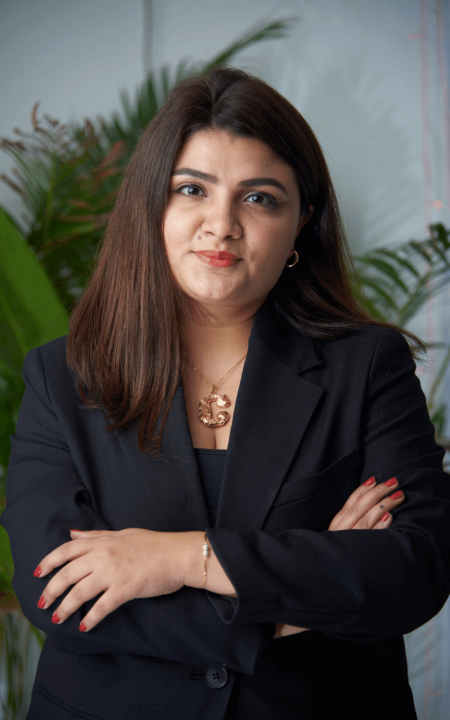
Charuka’s work draws inspiration from Hindu mythology, recognizing women as vessels of Shakti, the cosmic energy. She beautifully portrays powerful goddesses like Durga Maa riding a tiger or lion, symbolizing their unlimited power to protect virtue and combat evil.
Through her art, Charuka invites us into the world of women, showcasing their beauty, strength, and resilience. Her creations not only exhibit exceptional talent but also serve as an inspiration and a symbol of hope for those challenging societal norms.
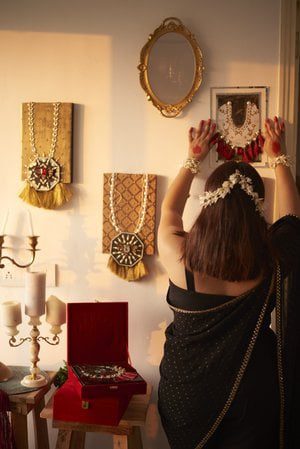
Arts to Hearts Podcast is a show delving into the lives and passions of renowned artists. From running creative businesses and studio art practices to cultivating a successful mindset, Charuka Arora engages in heartfelt conversations with her guests. Experience your personal happy hour with your favorite artists right in your studio.
Through candid discussions, Charuka and her guests reveal the joys and challenges of a vibrant creative life, both within and beyond our studios. Get ready to be inspired and uplifted as you tune in.
Ocki Magill
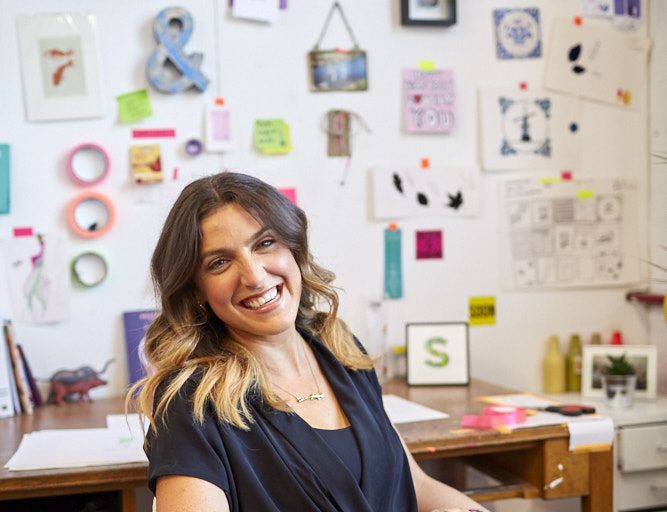
Ocki Magill is the visionary founder of Blue Shop Gallery in London. With roots in fashion design from Saint Martin’s, Ocki transitioned from a career in advertising and brand direction to establishing a unique art gallery that melds community, art, and commerce. Her journey has been characterized by a deep commitment to creating accessible artistic spaces, fostering a community of emerging artists, and leveraging her design skills to curate engaging exhibition experiences. Ocki is known for her entrepreneurial spirit and innovative approach to running a contemporary art gallery.
Ocki Magill is the visionary founder and creative director of Blue Shop Cottage, a vibrant and community-focused gallery based in Camberwell, South East London. With a background in fashion design from Central Saint Martin’s and a successful career in advertising and brand direction, Ocki boldly transitioned to the art world, where she has since established a unique space that blends art, community, and commerce. Blue Shop Cottage is known for its authenticity, approachability, and consistently fresh curation, always leaving room for surprises.
Ocki’s passion lies in supporting emerging artists, and her gallery embodies this mission through residency programs, online group shows, and solo exhibitions. She leverages her design expertise to create engaging exhibition experiences while fostering a nurturing environment that helps artists grow at every stage of their careers. Ocki’s entrepreneurial spirit and innovative approach have made Blue Shop Cottage a true haven for creatives, providing them an incredible platform to develop and thrive.
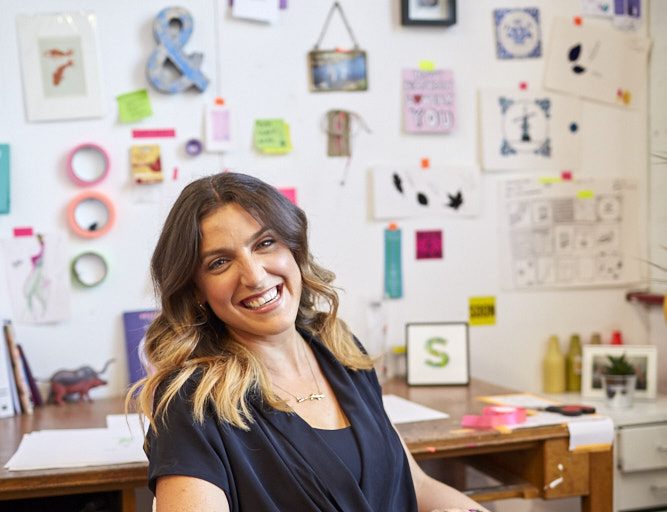
How Creativity Fuels Emerging Art Spaces
In an insightful conversation, Ocki Magill, the founder of Blue Shop Gallery, shares her journey from advertising and fashion design to building a space that supports artists. She talks about finding her way from working for big companies to pursuing something that felt more meaningful. “I worked really hard for these big corporations,” Ocki reflects, describing how she, like many others, eventually felt the need to shift towards something more personal and fulfilling.
Ocki’s transition from fashion to running a successful gallery shows how different experiences can come together to create something unique. She emphasizes how her design skills and love for community played a key role. “It wasn’t until we hosted an exhibition in 2018 that I realized my love of design and community all came together,” she says, showing how talents from one field can easily translate into another.
For Ocki, the gallery isn’t just a place to show art—it’s about creating a supportive, welcoming environment for new artists. She believes in creating art spaces that feel more connected and approachable than traditional white-walled galleries. It’s about building a community around creativity.
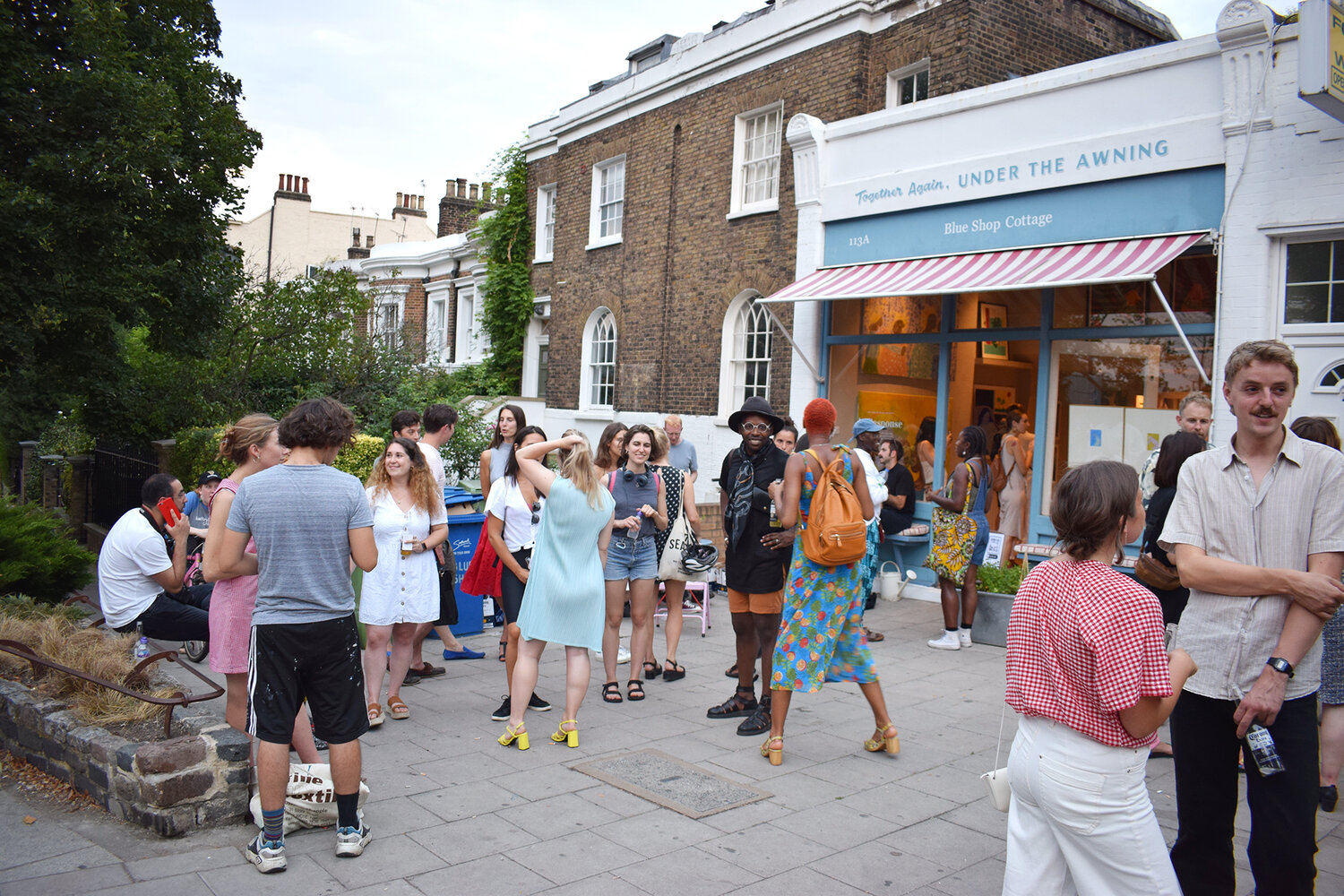
Tips for Emerging Artists: Focus on Craft and Presentation
Ocki offers practical advice for artists looking to break into the scene. The first step is to focus on your craft and ensure your work is well-prepared. “Make sure your work is well-stretched and finished properly,” she advises, stressing that attention to detail matters in a professional presentation.
In today’s world, having a robust online presence is essential. Ocki points out how critical high-quality images are, especially on platforms like Instagram. “I’m always looking at Instagram profiles, degree shows, and other exhibitions,” she explains, highlighting the importance of sharp, engaging visuals.
But it’s not just about being online. Ocki encourages artists to get out there and meet people, even though it can sometimes feel daunting. “Go to the shows, introduce yourself to people,” she says. Putting yourself out there and building relationships can be just as important as creating great art.
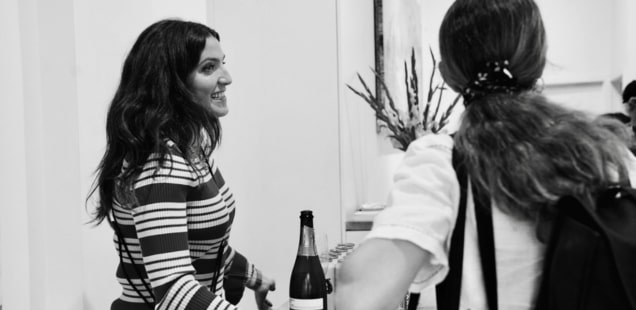
Adapting to a Changing Art World
Ocki’s journey also highlights how the art world continuously evolves, offering new opportunities for those willing to take a chance. She shares how her gallery adapted during the pandemic by moving online, which became a game-changer. “Going online was huge for the art world,” she explains, showing how digital platforms can connect artists with a global audience.
The success of Blue Shop Gallery’s virtual open calls is proof that the Internet can break down traditional barriers. Artists from all over the world showcased their work, gaining exposure they might not have had otherwise. “The internet is your friend,” Ocki reminds artists, encouraging them to use digital tools to their advantage.
Her approach to accepting the change reminds artists to stay flexible and open to new ways of sharing their work. Whether online or in person, the art world has many doors waiting to be opened.
“Why don’t you set yourself a task? You know, January is a great month for this. Everyone’s kind of buckling down anyway.”
Ocki Magill- Arts to Hearts podcast s04e37
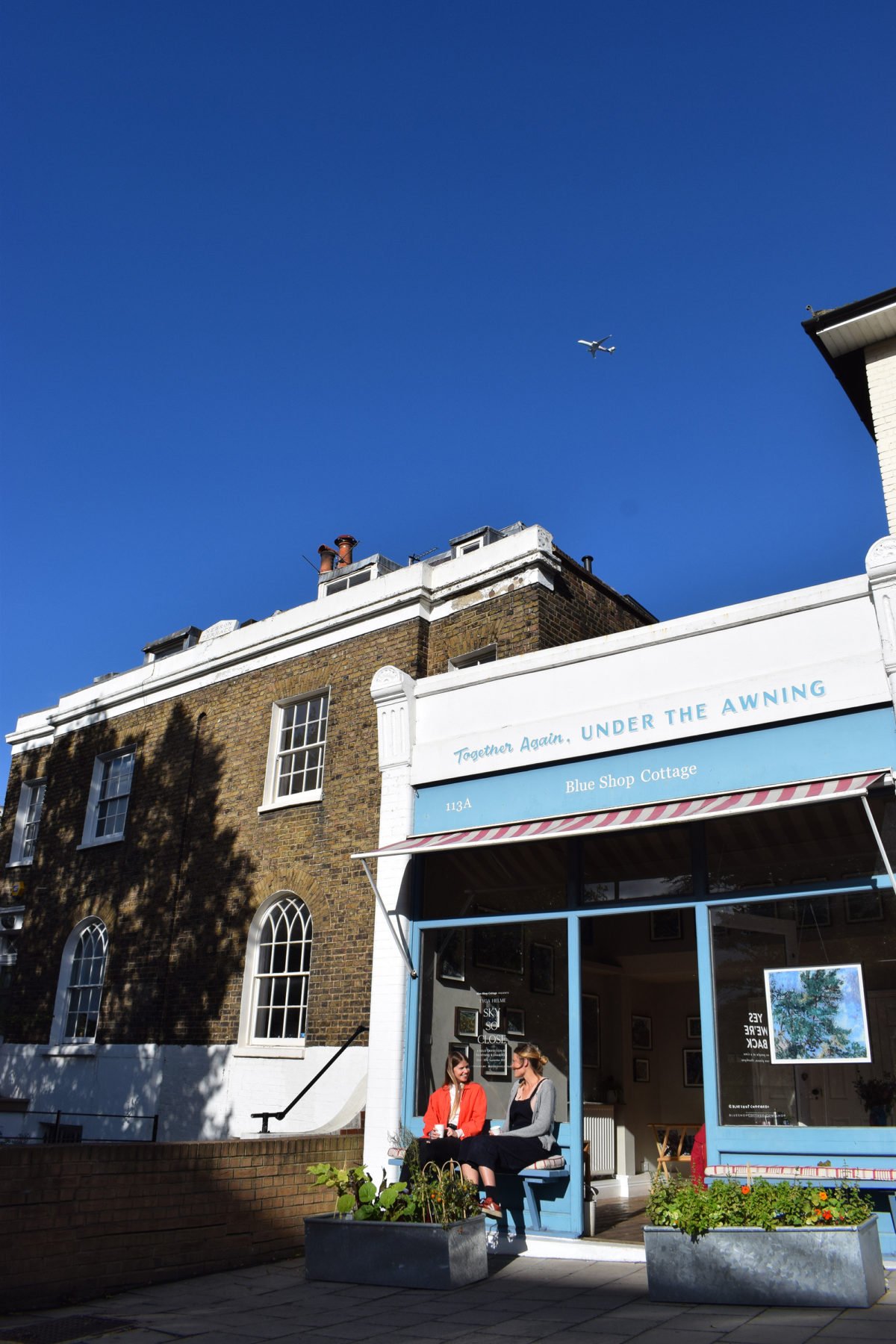
Celebrating Art and Community
The growth of Blue Shop Gallery, from a small idea to a thriving space, shows just how powerful creativity and community can be when combined. Auki has built a place where art and people come together meaningfully. She believes in supporting individuality and creating opportunities for artists to express themselves.
She encourages artists to put themselves out there, whether it’s through well-curated social media profiles or participating in free open calls like those at Blue Shop Gallery. “Give yourself a chance,” Auki says, reminding artists to stay persistent and resilient as they navigate their careers.
Ocki Magill’s journey from working in corporate jobs to starting Blue Shop Cottage shows how following your passion, being creative, and building a strong community can lead to success in the art world. She is dedicated to helping emerging artists and reminds us that connecting art with people online and in person is essential for keeping art spaces lively and welcoming. Ocki encourages artists to focus on honing their skills, reach out to others, and be open to the changes happening in today’s digital age. Her story is an inspiring example for artists and curators, showing that growth in the art world comes from working together, being flexible, and genuinely committing to the creative journey.
You can contact Ocki through her Instagram handle for more details about her work.
Click here to read more about the Arts to Hearts Podcast and its episodes.
Listen to this & other episodes on
How Artist Sarah Fishbein Turns 1950s Romance Comics into Modern Paintings
Inside Susie Sprinkel’s Art Stories Woven with Fabric and Thread
How The Restless Creative Anita Clipston Turns Trauma into Art
Inside Radhika Gupta-Buckley’s Creative Journey with Indian Roots



